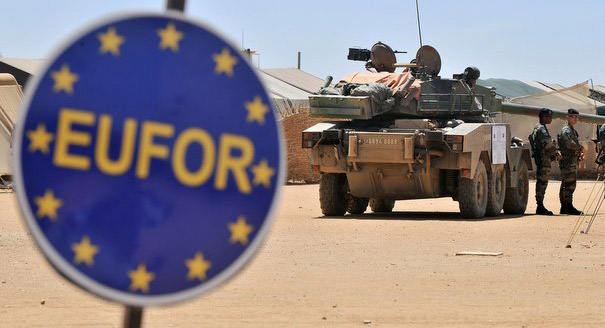Last week, U.S. columnist Anne Applebaum wrote about Europe. In her Washington Post column she asked whether Europe could become the policeman of the world in an era in which the United States had decided to renounce that role. The piece was a strident criticism of President Obama in what some are already calling the Obama doctrine of "leadership from behind".
Beyond her primary purpose of indirectly, but harshly, accusing Obama of lacking leadership, Applebaum raised a valuable European issue: what can Europe do in the realm of security and defense if it really has to?
At first glance, very little, it seems. The debate in Europe is too frustrating, the lack of zeal too obvious, the bickering between European governments too tedious.
But if you look at everything together: the interventions in Libya and Mali, more than a decade of military operations in Afghanistan, several rounds of military reform, and thousands of hours of often agonizing conferencing from Munich to Chicago to Brussels to Riga, a different picture emerges. Because, with all due caution, Europe can become the world's policeman. It can take charge of the wider European neighborhood directly, and it can indirectly provide security to the rest of the world, too.
How so?
It is crucial to understand that Europeans are no pacifists, as I wrote last week. They aren’t suicidal, either. The examples of Mali and Afghanistan prove that if there is a real threat looming, they are willing to dedicate significant resources and political will to countering it. They have the ability and knowledge to do so, they have some useful hardware to employ—albeit too little of it—and they even have money to spend, despite austerity. The limiting factor for Europe's role as policeman is not a lack of ability or even capability. It is strategic laziness, a willful ignorance of the overall threat and a lack of political ambition.
This attitude is the result of Europe's success in pacifying its own continent and, even more importantly, of living under the military and strategic guardianship of the United States for nearly seventy years. As such, it seems deeply engrained in the European psyche.
Still, none of this is set in stone. Europe’s passivity in security affairs, if profoundly challenged by reality, will give way to a much more pro-active role than most observers would deem possible. Take Afghanistan, Mali, and Libya, but also the anti-piracy missions of both the EU and NATO, and the less well-known but rather successful action taken both at military and non-military levels in Somalia. Just imagine what will be possible once the dangers become more "clear and present," more graspable, and closer to home. Which some of them almost inevitably will.
There is no doubt that this adjustment will be painful, costly, and politically difficult. It will be accompanied by tremendous soul-searching and many vicious, hair-rising debates. But that’s how it should be in Europe's open societies, none of which has entirely overcome the trauma of a war-ridden past. Germany, in particular, will only very gradually shed its reputation as a country too afraid of itself to be a force for good.
There will be limits to the adjustment. Europe will be, first and foremost, the policeman of its own part of the world. But that will have a strategic impact on the rest of the globe, as it will free up U.S. resources which are needed elsewhere. Europeans, by investing in their role as a regional provider of stability, will indirectly invest in the protection of their interests in regions beyond their immediate reach.
However, a more unified, integrated, fully pooled and shared approach to security and defense will very likely remain an illusion, even under drastically changed security circumstances. The burden of Europe’s new role will be carried mainly by two or three big countries in Europe, with the rest chipping in with specialized capabilities. The actual missions will be on a coalition of the willing basis, involving the United States at least as a technical enabler. Complete independence from U.S. capabilities seems neither possible nor desirable, even in the long run.
Adopting this new security role will lead to a significant shift in power among Europe's nations as sheer economic size will lose some of its importance. Military contributions will start to count for more again, giving those who are willing to provide them a greater say in the political affairs of the continent. This, in turn, could become a reason for Germany to rethink its policy of military restraint.
Finally, where will the volatile coalitions of the willing scenario leave NATO and the EU, the two organizations charged with keeping Europe whole and free and rich and safe? Just as today, they will be standing ready to multilateralize security and defense-related missions once that becomes politically necessary, as in the Libya case.
NATO Secretary General Anders Fogh Rasmussen reflected this more instrumental approach to Europe’s traditional institutions when he said at the Munich Security Conference last weekend: "We will continue to respond to crisis whenever, and wherever, the Allies judge their security interests at stake. Because this is our core business." Over the past two decades, Europe's multilateral architecture has proven remarkably flexible in accommodating the changing needs of the continent.
So, to sum it all up, the answer to Anne Applebaum is: Yes, we can, but only when we really have to. Then, laziness and complacency will give way to more engagement. Admittedly, it is sad that only outside pressure will change behavior.
But when has that ever been any different anywhere else? Given the way the world seems to develop, that pressure will come sooner rather than later.






